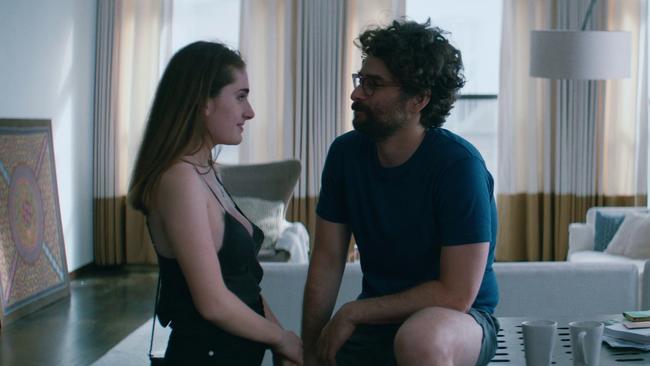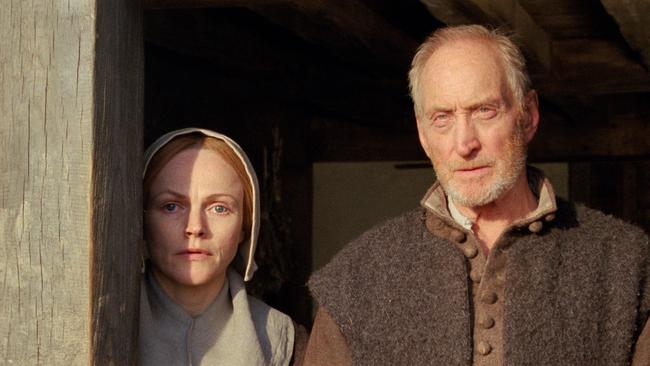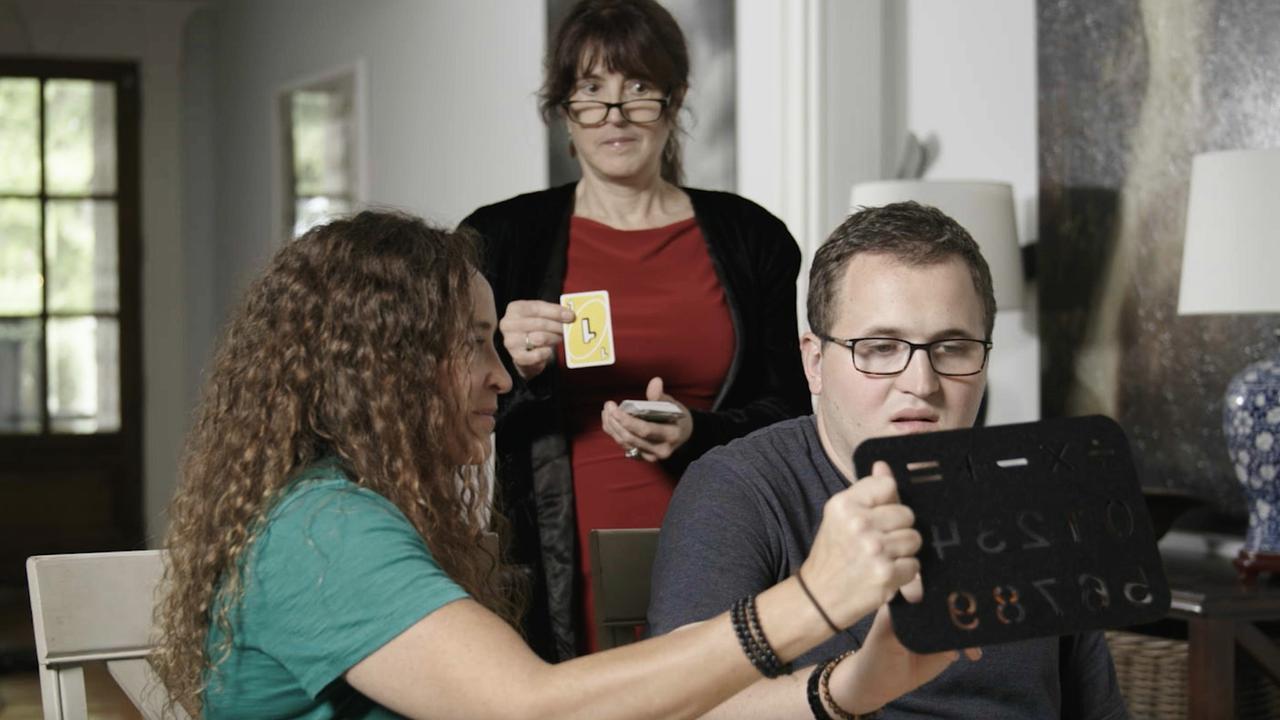Shiva Baby, when the affair turns up at a funeral
Danielle is having sex with older married man Max (Danny Deferrari). Then she bumps into him at a wake.

Shiva Baby (M)
In cinemas
★★★★
Writer-director Emma Seligman’s highly impressive first feature is a comedy of embarrassment. The protagonist, Danielle, beautifully played by Rachel Sennott, is a young Jewish woman with a mind of her own; her rebellious choices lead to actions that come back to bite her during a shiva, or wake. Beautifully written and acted by a talented ensemble, Shiva Baby is wily, witty, caustic and brutally honest.
While almost all of the film takes place at the shiva, the opening scene unfolds in the apartment that Danielle’s doting parents, Joel (Fred Melamed) and Debbie (Polly Draper) have provided for her. Danielle is having sex with Max (Danny Deferrari), a handsome, bearded fellow several years older. The scene ends unexpectedly when money and a bracelet change hands; Danielle is selling sex for cash.
Then her mother calls to remind her that she’s supposed to be attending the funeral of Uncle Peter’s second wife’s cousin – Abby? Or Annie? She’s not sure of the name of the deceased.
She arrives too late for the funeral, but the shiva is in full swing, with lots to eat and drink and a host of family friends and relatives who shower the diffident Danielle with questions, most of them along the lines of “Are you seeing anyone?” There’s also comment about her weight (“You look like Gwyneth Paltrow on food stamps, and not in a good way” she’s told).
One of the guests at the function is Maya (Molly Gordon), the daughter of Katherine (Glynis Bell), a family friend. Danielle is a bit embarrassed because she and Maya had had a “thing”: they’d gone together to the high school prom and, according to Maya, “had our first orgasm”. Maya is clearly still interested in Danielle, judging from the shy glances she gives her, but Danielle tries to avoid her. And then who should arrive but Max, accompanied by his beautiful blonde shiksa princess wife and their adorable baby daughter.
During the course of the wake things become increasingly embarrassing for Danielle. A lost mobile phone containing highly incriminating evidence is just one of her problems.
The film’s claustrophobic party scenes are inventively photographed by Maria Rusche, and there’s an unusual but appropriate music score – jarring guitar and piercing piano – by Ariel Marx.
This clever, abrasive debut is a notable achievement for Seligman who has expanded it from an earlier short film. It all feels closely observed, no doubt inspired by real characters, which makes it all the funnier.
-
Fanny Lye Deliver’d (MA15+)
In cinemas from Thursday
★★★★
The English Civil War (1642-1651) that pitted the Royalists, loyal to King Charles I, against the Parliamentarians (Roundheads) over the government of England, Scotland and Ireland was a bloody affair. After the Parliamentarian army won the Battle of Worcester in September 1651, Charles was beheaded and for the next eight years the country was ruled first by Oliver Cromwell and then, briefly, by his son, Richard. There haven’t been many films made about this turbulent period, the most prominent being Ken Hughes’s Cromwell (1970), in which Richard Harris played the title character and Alec Guinness the doomed monarch. Now maverick British director Thomas Clay has made, with Fanny Lye Deliver’d, a haunting and intimate drama set in 1657 during the brief and violent period in which, an opening title claims, “our modern notions of personal, political and sexual freedom were forged”.
Clay sparked a major controversy with his challenging first feature, The Great Ecstasy of Robert Carmichael (2005), a raw and brutal film set at the time of the 2003 invasion of Iraq that dealt with bored young men who commit the most horrendous sexual violence. The film was so extreme that it was barely seen, yet it was clearly the work of an intelligent and potentially gifted filmmaker. I haven’t seen Clay’s follow-up, Soi Cowboy (2008), which he made in Thailand, but Fanny Lye confirms the original vision and talent of the director.
As with Great Ecstasy, this film evokes other movie genres: the western and the home invasion thriller among them, but it’s in a class all of its own. The entire drama takes place in and around the small, isolated Shropshire farm where John Lye (Charles Dance in one of his strongest screen performances), a former officer in Cromwell’s army, lives with his much younger wife, Fanny (Maxine Peake) and their young son, Arthur (Zak Adams). Lye is Puritan through and through, a strict disciplinarian who beats his wife and son if, in his narrow view, they have transgressed. Fanny accepts her lot and receives her punishment.
The film is narrated by a woman, and at first this is slightly puzzling because the narrator is not Fanny. All becomes clear, though, when, one Sunday morning after attending services – Lye riding their only horse while his wife and son walk beside him – the family returns home to find visitors: Thomas (Freddie Fox) and Rebecca (Tanya Reynolds) – who we have already glimpsed running naked through the woods – claim to have been robbed of all their possessions while they were travelling on foot to Bristol to board a ship for the New World.
Reluctantly, Lye gives the young couple shelter but very soon their true colours are revealed when the Most High Sheriff (Peter McDonald) arrives at the farm on a mission to locate and arrest two people wanted for preaching “levelling” – a libertarian doctrine that embraces free sex among other heresies. Levellers are accused of being “licentious heretics”, free thinkers and of taking part in orgies. Before the sheriff reaches the house, Thomas and Rebecca threaten to kill young Arthur if Lye reveals their presence, and when the officials leave, Lye and his family find themselves prisoners.

As the title suggests, Fanny Lye Deliver’d is a story of female liberation. Although not as confronting as Great Ecstasy, the film gradually tightens the screws of suspense and is the more gripping because the outcome is far from certain. In addition to Dance’s memorable performance as the stern Puritan, all the members of the small cast are excellent, with Peake outstanding as the conflicted Fanny.
That Clay has a painterly eye for visual composition is confirmed by his use, in both of his English-set films, of the great Greek cinematographer Giorgos (or Yorgos) Arvanitis, whose unforgettable work on the films of his compatriot Theo Angelopoulos have confirmed him as one of the great cinematographers. Here, the mist-shrouded farm and its environs are artfully photographed and framed, and the result is a film that is not only strong and uncompromising but also exceptionally beautiful.
-
Rosa’s Wedding (La boda de Rosa) (M)
In cinemas
★★★
Rosa (the excellent Candela Pena) is on the cusp of 45, a single woman who works in the costume department of a film studio in Valencia. She’s the one on whom every family relies. Her widower father, Antonio (Ramon Barea) wants to move in with her; her alcoholic sister, Violeta (Nathalie Poza), makes demands on her as does her hopeless brother, Armando (Sergi Lopez), whose marriage is falling apart. Her daughter, Lidia (Paula Usero), returns from living in Manchester with an Englishmen bringing with her baby twins.
It’s all too much for Rosa who decides she wants a life of her own – she quits her job and heads for the small seaside town of Benicassim where she plans to establish herself as a seamstress in an empty shop owned by her late mother. She also announces to her amazed family that she plans to get married – to herself.
The comedic possibilities in Rosa’s Wedding are muted in the handling of co-writer and director Iciar Bollain – herself a former actress – but the performances and the somewhat unusual approach to a feminist statement partly compensate for the narrative shortcomings.



